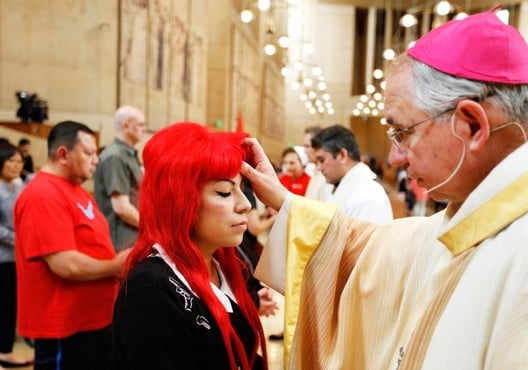Anointing of the Sick
Anointing of the Sick is bestowed upon anyone who is in a moment of distress in their life and is in need of God's grace and mercy to be restored to full health. In the past, this was referred to Extreme Unction, Last Rites, or the Final Anointing, and was typically only offered to someone in an extreme circumstance and being faced with death. Today, there is a broader understanding of the sacrament as a ritual of healing appropriate not only for physical but also for mental and spiritual sickness. It is therefore administered to anyone who is in sickness, distress, or old age. Through this sacrament, the Church comforts and supports the person who is suffering and continues the healing ministry of Christ. For those who are about to die, the Church, in addition to the Anointing of the Sick, offers the Eucharist as viaticum – food for the journey home.
Common Questions - Anointing of the Sick
Bringing spiritual and, sometimes, physical strength in times of illness or impending death.
“The Anointing of the Sick ‘is not a sacrament for those only who are at the point of death. Hence, as soon as anyone of the faithful begins to be in danger of death from sickness or old age, the fitting time for him to receive this sacrament has certainly already arrived.’ If a sick person who received this anointing recovers his health, he can in the case of another grave illness receive this sacrament again. If during the same illness the person's condition becomes more serious, the sacrament may be repeated. It is fitting to receive the Anointing of the Sick just prior to a serious operation. The same holds for the elderly whose frailty becomes more pronounced.” (Catechism of the Catholic Church, 1514-1515].
The Anointing of the Sick was traditionally referred to as Extreme Unction or Last Rites, perhaps giving the illusion that the sacrament is meant only for those who are at the point of death.
“In addition to the Anointing of the Sick, the Church offers those who are about to leave this life the Eucharist as viaticum. Communion in the body and blood of Christ, received at this moment of ‘passing over’ to the Father, has a particular significance and importance. It is the seed of eternal life and the power of resurrection, according to the words of the Lord: ‘He who eats my flesh and drinks my blood has eternal life, and I will raise him up at the last day.’ The sacrament of Christ once dead and now risen, the Eucharist is here the sacrament of passing over from death to life, from this world to the Father.” (Catechism of the Catholic Church, 1524).
